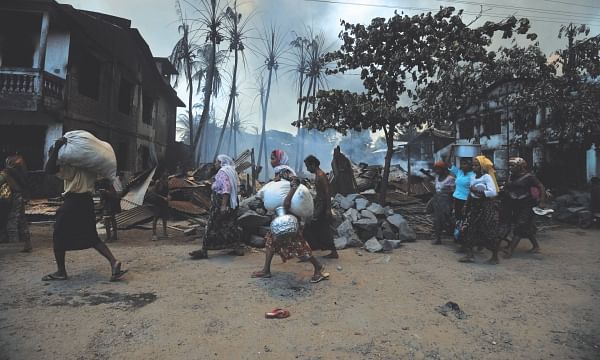| Home - Back Issues - The Team - Contact Us |
 |
| Volume 11 |Issue 25| June 22, 2012 | |
|
|
Perspective
The Exodus Despite all that is written and all that is said, is anyone actually worried about the state of the Rohingyas? Sushmita S Preetha We all seem to be playing catch with the Rohingyas. It's terrible, we all say, as we shake our heads in outrage and issue fiery statements about the inhumanity with which they are being stripped off their land, identity and basic human rights. It must be stopped, this insanity against them, we proclaim, and till then, we should provide them with refuge and humanitarian aid. But when it comes to taking responsibility, we all want someone else to do the right thing. 'You, catch!' says the West to Bangladesh, while the former gives an elaborate and lavish welcome to Aang Saang Suu Kyi on her auspicious visit to Europe. Bangladesh, meanwhile, is in no mood to play the game. 'Take it, it's yours,' it states – 'if you're so concerned, why don't you do something about it?' It has been two weeks since this game of catch began, and one wonders if it's only a matter of time till the ball is dropped. Pretty soon, the players will move on to another game of vicious power-play and self-motivated righteousness. The Rohingyas will disappear from the headlines into an unknown and dark abyss of violence and oppression. For the powerful players in the game, their plight will be but a small sacrifice to pay to protect national and global interests. For obvious geo-political reasons, Bangladesh has once again found itself on the other side of an exodus. But unlike the last few times when it grudgingly opened its borders to its Muslim brothers, it is now refusing to play host. After all, it is one thing to be hospitable to a guest you know will leave in a few days; it's a completely different thing, however, when you don't know how long they will be staying or how many mouths you'll have to feed, especially when you are struggling to feed your own family members.
And let's be frank, Bangladesh hasn't been a particularly gracious host to the existing Rohingya population in the country, anyway. We have restricted their physical and economic mobility and have categorically refused to acknowledge the gross violations of their rights in the border areas. In other words, we've made sure they don't find our home too comfortable; lest they begin to think of themselves as members of the family, we've made them feel like an unwanted leech, much like the poor relative from the village who has no one else to turn to. Bangladeshi officials and diplomats don't seem to have trouble sleeping at night knowing full well the uncertain and brutal future that awaits the Rohingyas in Myanmar. We didn't sign any international agreements to allow refuges, they assert, so really we are under no obligation – legal, moral or otherwise – to go out of our way to entertain them. So what if they die on the troubled waters on the Bay of Bengal as they try to make the treacherous journey from one hell to another, or at the hands of an angry mob of Rakhaines? For once, all these people dying from hunger and hatred is not our problem… just as long as they're decent enough to undergo violations on the other side of the border. To defend the country's rigid stance, our foreign minister has resorted to highlighting the criminal nature of these refugees. They're religious extremists, she cries, we can't possibly harbour them! The media, too, seems to find pleasure in depicting the iniquitous doings of the Rohingyas in polluting the moral fibre of this country, conveniently forgetting to mention how, given the abhorrent social and economic conditions in which they survive, they don't really have much of a choice in leading a regular life. Their movements are severely restricted; they have limited, if any, access to jobs and are arbitrarily debased by the military. Resorting to crime is often the only way they can ensure food and shelter for themselves. But let's not waste our breath in defending these people who must be hated and ‘othered’ if we are to justify our less-than-humane position to ourselves. Meanwhile, the aid and human rights organisations around the world have lost no time in vilifying Bangladesh for its cruel stance. How could you, they shriek in horror, you must not leave them at the mercy of the malicious Myanmar! They ensure Bangladesh they will help in every possible way, with technical and financial support. But it remains unclear how and to what extent they will provide assistance. If they can't promise anything more sustainable and effective than the 'help' they have been offering the Rohingyas over the years, then can we really blame struggling Bangladesh for refusing to take on the responsibility of its poor neighbour? In their righteous indignation, they forget that countries all over the world, not excluding the mighty Europe and the USA, have consistently turned their backs on refugees. Where was the outrage when the boat people from Cuba were denied access to the US? Where is the overflow of compassion when refugees, especially brown and African ones, are treated inhumanely by every European country? How eager are they to open up their borders to the helpless then? We know how efficiently the Bhutanese refugees in Nepal were relocated to third countries. But would foreign countries be as willing, and the UNHCR as resourceful, on the question of the Muslim minority group? No Western country would want to dirty its hands and volunteer to take in a large group of brown Muslims. But we all know it's much easier to be noble and – what's that word? – humanitarian when our own national interests aren't at threat. Speaking of national interests, the US and its Western allies have acted with characteristic foresight. Not surprisingly, they find it wiser to pressurise Bangladesh than to tell Myanmar to stop all this nonsense. Of course, we know that the US does not intrude in the internal affairs of a country in the name of 'peace and democracy' unless the countries have oil mines or something else to offer. The once harsh relations between the US and Myanmar are now warming at a startling speed, and it would be a pity to sour it over an unpleasant discussion over a Muslim minority group. After all, Myanmar is to play an instrumental role in the 'new American century 'in the Asia Pacific, and only the suicidal would prioritise the easing of ethnic tension in a country that has just opened its doors to Western investment. In what can only be called an ironic turn of events, the great martyr and friend of the West, Aung San Suu Kyi, is on a grand tour to Europe to receive her Nobel Prize at the same time that the Rohingyas are being mass murdered. Should she not have stayed in Myanmar to sort out the problem, taking a strong stance against the ensuing injustices against Myanmar's minorities? Alternatively, should she not be spending her time in Europe to convince European leaders to vehemently decry these recent human rights violations? But like the rest of the world, Suu Kyi also has to think about the consequences of her support for the Rohingyas. She has remained evasive and vague on questions about the citizenship status of Rohingyas, not wishing to alienate the vast majority of her Buddhist voters. Defending the Rohingya is politically risky for her. But we must not forget, human rights defenders are human too – they also need to worry about their own selfish interests! So where does that leave the Rohingyas? In the same place they have been since the majority Buddhists in the Rakhine state started to torture and kill them – vulnerable, dehumanised and at the mercy of actors who care more about passing the ball onto the next player than taking on responsibility.
|
||||
Copyright
(R) thedailystar.net 2012 |

